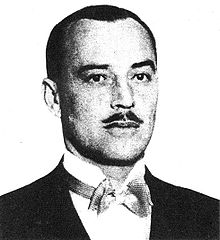George Lloyd, 1st Baron Lloyd
|
The Right Honourable The Lord Lloyd GCSI GCIE DSO PC |
|
|---|---|
 |
|
| Governor of Bombay | |
|
In office 16 December 1918 – 8 December 1923 |
|
| Monarch | George V |
| Preceded by | The Marquess of Willingdon |
| Succeeded by | Sir Leslie Orme Wilson |
| High Commissioner in Egypt | |
|
In office 1925–1929 |
|
| Monarch | George V |
| Preceded by | The Viscount Allenby |
| Succeeded by | Sir Sir Percy Loraine, Bt |
| Secretary of State for the Colonies | |
|
In office 12 May 1940 – 4 February 1941 |
|
| Monarch | George VI |
| Prime Minister | Winston Churchill |
| Preceded by | Malcolm MacDonald |
| Succeeded by | The Lord Moyne |
| Leader of the House of Lords | |
|
In office December 1940 – 4 February 1941 |
|
| Monarch | George VI |
| Prime Minister | Winston Churchill |
| Preceded by | The Viscount Halifax |
| Succeeded by | The Lord Moyne |
| Personal details | |
| Born |
19 September 1879 Olton Hall |
| Died | 4 February 1941 (aged 61) |
| Nationality | British |
| Political party | Conservative |
| Spouse(s) | Hon. Blanche Lascelles (1880–1969) |
| Alma mater | Trinity College, Cambridge |
George Ambrose Lloyd, 1st Baron LloydGCSI GCIE DSO PC (19 September 1879 – 4 February 1941) was a British Conservative politician strongly associated with the "Diehard" wing of the party.
Lloyd was born at Olton Hall, Warwickshire, the son of Sampson Samuel Lloyd (whose namesake father was also a Member of Parliament) and Jane Emilia, daughter of Thomas Lloyd. He was educated at Eton and Trinity College, Cambridge. He coxed the Cambridge crew in the 1899 and 1900 Boat Races. He left without taking a degree, unsettled by the deaths of both his parents in 1899, and made a tour of India.
In 1901 Lloyd joined the family firm Stewarts & Lloyds as its youngest director. In 1903 he first became involved with the tariff reform movement of Joseph Chamberlain. In 1904 he fell in love with Lady Constance Knox, daughter of the 5th Earl of Ranfurly, who forbad the match with his daughter considering him unsuitable (she then married Evelyn Milnes Gaskell, son of Rt. Hon. Charles Gaskell, in November 1905). In 1905 he turned down an offer by Stewarts & Lloyds of a steady position in London and chose to embark on a study of the East in the British Empire. Through the efforts of his friends Samuel Pepys Cockerell, working in the commercial department of the Foreign Office, and Gertrude Bell, whom he had come to know, he started work as an unpaid honorary attaché in Constantinople. At "Old Stamboul" – as he came to remember the Embassy of Sir Nicholas O'Conor – he worked together with Laurence Oliphant, Percy Loraine and Alexander Cadogan. There also he first met Mark Sykes and Aubrey Herbert. In April 1906 Aubrey Herbert joined him on an exploration of the state of the Baghdad Railway. His confidential memorandum of November 1906 on the Hejaz railway gave a detailed account of many economic problems. This, and other papers – on Turkish finance, for example – led to his appointment in January 1907 as a special commissioner to investigate trading prospects around the Persian Gulf.
...
Wikipedia
